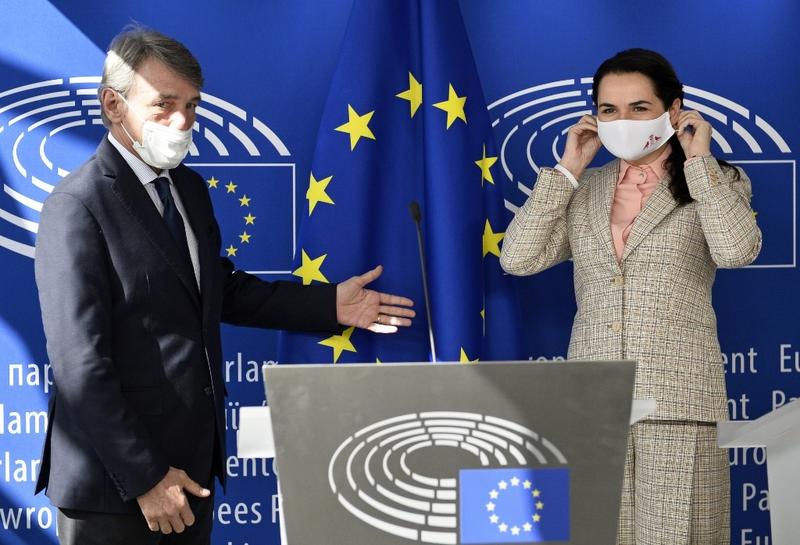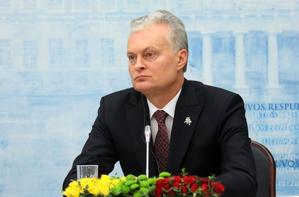 Belarusian opposition leader Sviatlana Tsikhanouskaya (right) and European Parliament President David Sassoli attend a news conference, in Brussels on September 21, 2020. (JOHANNA GERON / POOL / AFP)
Belarusian opposition leader Sviatlana Tsikhanouskaya (right) and European Parliament President David Sassoli attend a news conference, in Brussels on September 21, 2020. (JOHANNA GERON / POOL / AFP)
BRUSSELS / VILNIUS - The main opposition leader of Belarus urged the European Union on Monday to approve sanctions on officials accused of rigging the presidential election last month, travelling to Brussels to tell the bloc’s foreign ministers to show courage.
Despite a sixth straight weekend of mass protests against President Alexander Lukashenko over the disputed Aug 9 vote, the EU has yet to follow through on a threat to impose sanctions on a list of some 40 Belarusian officials.
Despite a sixth straight weekend of mass protests against President Alexander Lukashenko over the disputed Aug 9 vote, the EU has yet to follow through on a threat to impose sanctions on a list of some 40 Belarusian officials
“EU leaders have reasons not to push sanctions but I asked them to be more brave,” Belarus opposition leader Sviatlana Tsikhanouskaya, who fled to Lithuania after the election, told reporters after meeting foreign ministers.
“Sanctions are important in our fight because it’s part of pressure that could force the so-called authorities to start dialogue with us in the opposition council.”
The EU said in late August it would impose asset freezes and travel bans on Belarusian officials. But sanctions require agreement among all 27 member states, and the Belarus issue has become entangled in a debate over separate sanctions against Turkey, sought by Cyprus in a dispute over energy resources.
ALSO READ: Russia warns US, EU against interference in Belarus
Cyprus says it supports sanctions on Belarus but wants the bloc to act over Turkey as well.
“Our reaction to any kind of violation of our core, basic values and principles cannot be a la carte. It needs to be consistent,” Foreign Minister Nikos Christodoulides said.
EU leaders will discuss the Cyprus issue on Thursday at a summit. EU diplomats say Germany is concerned sanctions would undermine diplomatic progress in easing tension with Ankara.
Lithuania’s Foreign Minister Linas Linkevicius, one of the strongest advocates for Belarus sanctions, said he hoped other EU countries “will not keep the European Union in limbo and will not take (it) hostage”.
 In this Nov 27, 2019 file photo, the Lithuanian President Gitanas Nauseda attends a joint press conference with the President of Ukraine (unseen) after talks at the presidential palace in Vilnius, Lithuania. (PETRAS MALUKAS / AFP)
In this Nov 27, 2019 file photo, the Lithuanian President Gitanas Nauseda attends a joint press conference with the President of Ukraine (unseen) after talks at the presidential palace in Vilnius, Lithuania. (PETRAS MALUKAS / AFP)
The presidents of Lithuania, Poland and Romania said on Monday they will ask EU leaders at this week’s summit to offer an economic support package for Belarus if it holds a democratic election. That would include a favourable trade regime with the EU, visa-free travel and support as a candidate for the World Trade Organization.
Financial assistance for reforms, and help to diversify its energy sector and transition towards liberal economy was also part of the support package.
The support would only be offered after “new, democratic elections” with interational observers in the country, the Lithuanian president’s office told Reuters.
“If Belarus citizens decide to undergo political and economic reforms in the country, to establish independent institutions to defend human rights and freedom of speech - we will help with our knowledge and experience”, Lithuanian President Gitanas Nauseda said in a statement.
Poland wants the European Union to offer Belarus financial assistance of at least 1 billion euros (US$1.18 billion) as part of a “Marshall plan” to rebuild the country, Prime Minster Mateusz Morawiecki said last Thursday.
READ MORE: US troops to start exercises in Lithuania amid tensions over Belarus
Belarus was plunged into turmoil following a presidential election last month that President Alexander Lukashenko says he won by a landslide, but the opposition says was rigged. In power for 26 years, he has shown scant inclination to resign, buoyed by support from Russia.


